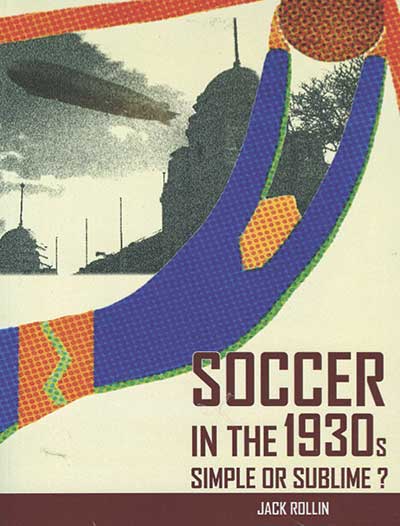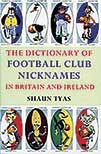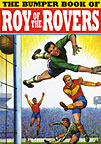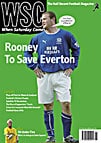In this exclusive WSC Supporters’ Club edition of the podcast, magazine editor Andy Lyons, writer Harry Pearson and host Daniel Gray discuss nominative determinism from Wolfgang Wolf of Wolfsburg to Notts County’s Harry Daft. There is also talk of the unexpected birthplaces of some footballers, and a conversation about football annuals and almanacs including Len Badger, Rothmans and Jack Charlton, shopkeeper. Record Breakers takes us to Munich, Stockholm and Skegness, and into the world of Ray Clemence’s Soccer Clocks.
Search: 'football annuals'
Stories
 Simple or sublime?
Simple or sublime?
by Jack Rollin
Soccerdata, £18
Reviewed by Roger Titford
From WSC 351 May 2016
What a curious book this is. At first I thought it was a reprint but it is a new offering from Jack Rollin (of Rothmans Football Yearbook fame) and published by Soccerdata, the imprint of another revered statto, Tony Brown. It may have taken as its model and inspiration Geoffrey Green’s classic Soccer In The Fifties but it reads rather less fluently. Imagine a decade’s worth of the Rothmans Yearbook condensed and set to workaday prose. It’s hours of fact, the whole gamut of the game – internationals, England, Scotland, Amateurs, the Army Cup and the Varsity match – comprehensively covered. If you are about 95 years old you may well get some of those “Ah, I remember that” moments.
 In
Britain And Ireland
In
Britain And Ireland
by Shaun Tyas
Paul Watkins, £19.95
Reviewed by Roger Titford
From WSC 319 September 2013
Shaun Tyas opens a new area in the examination of the minutiae of football culture. We’ve had stadiums, haircuts, kits, programmes, even Subbuteo; why not club nicknames? I would not have thought that it was an overly promising proposition but by dint of thorough desk research, extensive use of Wikipedia and taking the whole of the British Isles (including Isle of Man) as his canvas he generates over 350 pages of entries. He quotes a beautiful 19th-century aphorism – “a nickname is a biography in a word” – as a kind of justification for the study. Not only do so many clubs share the same nickname (I note to my surprise 11 cases of the Royals) but some clubs have many nicknames.
The main entertainment value lies in the archaic and the unofficial nicknames rather than the official and the well-known stories. To give an idea of the scope here are all the nicknames he found associated with Bristol City: Babes, Cider Army, City, Eighty-Twoers, Reds, Robins, Slave Traders, Turnips and Wurzels. As you might well imagine a number of these have been bestowed by fans of rival clubs and are sourced from a 2003 fans’ survey. Old football annuals and cigarette cards provide much of the source material.
Tyas has tackled his subject more from the top down – that is using official and often national sources, rather than from individual club histories and fan interviews. The inevitable and forgivable consequence is some omissions, common to the first edition of any dictionary. For instance, Reading have also been known as the R’s which has mutated into URZ and been in common usage over the past decade; the apparently unknown derivation of Spanners (a Charlton nickname for Millwall) dates to a spanner-throwing incident at Elm Park in August 1995.
Small gaps perhaps but Tyas has approached his task in a determinedly scholarly way with a full complement of appendices, indices, bibliography and cross-references that allow the reader to skip easily around the main body of the text. If that were not sufficient he offers a detailed four-step classification of nicknames into 50 categories so that in “name-based on locality/human history/language/proverbial sayings” you will find “The Bairns” (Falkirk) and three possible derivations thereof.
There are times when one could feel that this is a lightweight subject taken rather too seriously but then nobody nowadays would dismiss the 1960s folklore work of Peter and Iona Opie on children’s nursery rhymes and playground games which at the time may have appeared inconsequential. Moreover, while Tyas is methodical and, as far as I can tell, factually very sound, he writes with real joy and positivity about his chosen subject. This dictionary is an entertaining volume to dip into and there cannot be a fan who would fail to learn something of interest or amusement. I’d never heard of the Old Farm derby (Norwich v Ipswich) or this neat, modern biography in a word: Jackburn for Blackburn.
 Titan Books, £12.99
Titan Books, £12.99
Reviewed by Harry Pearson
From WSC 266 April 2009
As a boy I always resented those bits of the comic annual that were given over not to the strips but to solid blocks of text, what my mother would term “proper stories”. It struck me that, like the bizarre habit of putting hard centres in boxes of chocolates, this was just another adult way of limiting a child’s enjoyment of life.
 Footballers’ autographs are big business these days. Al Needham went to an exhibition at the NEC to snub Jimmy Greaves and see what an old Tony Woodcock would be worth
Footballers’ autographs are big business these days. Al Needham went to an exhibition at the NEC to snub Jimmy Greaves and see what an old Tony Woodcock would be worth
The first autograph I ever got was a signed photo of Tony Woodcock kneeling behind the League Cup, in exchange for my Dad moving house for him. I would dig it out now, but I chucked it away when he was transferred to Cologne. I filled up assorted notebooks with autographs purloined at the Nottingham Forest training ground and outside dressing rooms after matches. Brian Clough always wrote “Be good” after his name, Martin O’Neill always had a face like a smacked arse when he did his and John Robertson always said: “Jesus, not you again.”